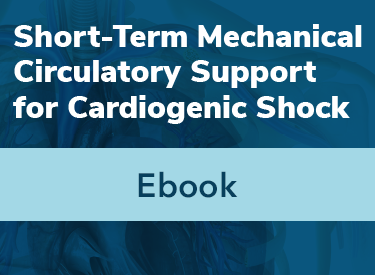WASHINGTON—The Society for Cardiovascular Angiography and Interventions (SCAI) has published a comprehensive guide to managing cardiogenic shock using mechanical circulatory support (MCS) devices in its latest eBook, "Short-Term Mechanical Circulatory Support for Cardiogenic Shock." This resource is essential for those seeking to enhance their knowledge of MCS technologies and improve patient outcomes.
The eBook was developed as a practical and user-friendly resource for all healthcare professionals involved in cardiovascular care, including clinicians, educators, and researchers. The authors emphasize best practices with a brand-neutral tone, ensuring an objective and balanced perspective.
“We are excited to introduce a highly practical, user-friendly, and up-to-date overview of MCS systems for cardiogenic shock. This comprehensive resource features insights from a diverse group of cardiovascular specialists from around the globe, providing a broad set of shared experiences,” said the book’s executive editors, Dr. Adhir Shroff, MD, MPH, FSCAI; Alexander G. Trusdell, MD, FSCAI; and Duane Pinto, MD, MPH, FSCAI. “The content covers everything from diagnostic algorithms to device selection and management of complications. The visually engaging and interactive e-book format caters to diverse learning styles, making the material accessible and enjoyable. We hope that you find this e-book to be a useful educational tool in your practice.”
The MCS Ebook adds to the growing family of timely, relevant, and practice-based ebooks covering topics such as Vascular Access, TEER, and Coronary bifurcation lesions.
Sponsored by SCAI and supported by Abiomed, “Short-Term Mechanical Circulatory Support for Cardiogenic Shock” provides a structured approach to understanding cardiogenic shock and the application of MCS devices. Five sections cover topics from hemodynamics to device selection:
- Introduction to Cardiogenic Shock and Therapies: This section provides a comprehensive introduction to cardiogenic shock, including an overview of the condition, differences between heart failure and acute myocardial infarction, hemodynamic assessment techniques, treatment escalation guidelines, and shock protocols involving teams and centers.
- Patient Identification and Device Selection: Learn the intricacies of effectively using mechanical support devices. This section guides you through patient identification, device selection, and access and closure techniques in MCS. Chapters focus on best practices for large-bore femoral artery access and closure, strategies for monitoring prolonged MCS use, anticoagulation strategies, and vasoinotropic considerations.
- In-Depth Review of Devices: This section provides an in-depth review of MCS devices, covering essential topics. The review begins with an examination of pulsatile devices, followed by a detailed look at the Impella family of MCS axial flow pumps and the Tandem Heart device. The section also offers a comprehensive overview of ECMO, including both VA ECMO and V-V ECMO. Finally, it addresses critical aspects of ECMO patient management, such as weaning, troubleshooting, left ventricular unloading, and closure techniques.
- Device Selection and Recommendations: This section provides a comprehensive overview of short-term mechanical circulatory support, focusing on device considerations, selection, and combinations based on clinical needs, along with best practice recommendations.
- Innovations and Future Directions in MCS: This section highlights emerging technologies, new devices, and evolving treatment paradigms that shape the future of cardiogenic shock management. Advances in MCS are enhancing patient mobility, reducing resource requirements, and providing decision-support tools for clinicians. Artificial intelligence and machine learning are set to predict trends and improve patient outcomes. At the same time, smaller bore devices and alternative access options will facilitate application to larger patient populations, promoting recovery and ambulation.
What's New in Interventional Cardiology
Ground-breaking stories about what's happening in the field.

